strangers
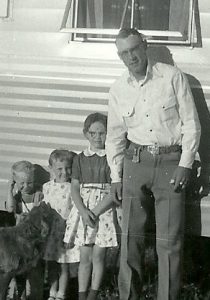
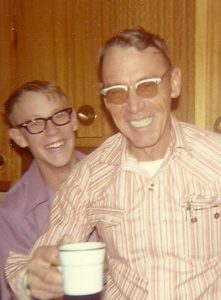 My father-in-law, Walt Schulenberg was a hard working, but gentle and loving man. His family was everything to him. His job often took out of town on road construction. He was often gone for long periods of time on jobs. My father-in-law, Walt Schulenberg was a hard working, but gentle and loving man. His family was everything to him. His job often took out of town on road construction. He was often gone for long periods of time on jobs. When they could, the family would go along, such as the summer the company was working in Point of Rocks, Wyoming. For those who don’t know it, there is nothing to do in Point of Rocks. It is a small town in Sweetwater county that sports a permanent population of three. During the year there are many temporary residents throughout the year, but that does not count in the census.
My father-in-law, Walt Schulenberg was a hard working, but gentle and loving man. His family was everything to him. His job often took out of town on road construction. He was often gone for long periods of time on jobs. My father-in-law, Walt Schulenberg was a hard working, but gentle and loving man. His family was everything to him. His job often took out of town on road construction. He was often gone for long periods of time on jobs. When they could, the family would go along, such as the summer the company was working in Point of Rocks, Wyoming. For those who don’t know it, there is nothing to do in Point of Rocks. It is a small town in Sweetwater county that sports a permanent population of three. During the year there are many temporary residents throughout the year, but that does not count in the census.
During the summer that my husband, Bob’s family lived there while my father-in-law worked in the area, Bob was a bored kid. Here he was living in Podunk, with nothing to do, and mostly just his sisters and a couple of other kids to hang out with. There was a highlight to the day…when the trains came through. The trains were on the opposite side of the interstate, so it was safe for Bob to run down the street and count the cars on the train. It was a pathetic attempt at fun, but the reward was great…the family got to see his dad every day, and not just on weekends for one day. It was worth it to all of them.
My father-in-law had made the decision to be with the family as much as he possibly could. I’m not sure if his decision was before or after another incident I had heard of. When my sister-in-law, Brenda was about six months old, my father-in-law was out of town a lot. He came home on the weekends, and sometimes not even that often. It was hard on the family, but they were making due…most of them anyway. Brenda was a happy baby, and was known to laugh and smile at her family all the time. One particular weekend, my father-in-law 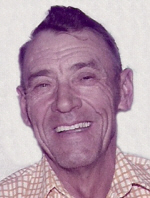
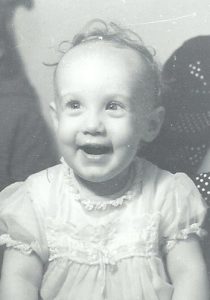 came home, and Brenda took one look at him and started screaming and crying. It was at about the time when babies start to dislike strangers, but that didn’t matter to my father-in-law. He just knew he shouldn’t be a stranger to his own child. Nevertheless, Brenda didn’t stop crying until he left to go back to work. As for my father-in-law…he went back to wok and gave his notice. He knew he could find another job, but he refused to see his little girl upset, because she didn’t know her daddy. He made sure that he worked where he could be home at night, even if he had to go to work ar 3:00 in the morning in order to be home in the evening. He was always a dad first. Today would have been my father-in-law’s 91st birthday. Happy birthday in Heaven, Dad. We love and miss you very much.
came home, and Brenda took one look at him and started screaming and crying. It was at about the time when babies start to dislike strangers, but that didn’t matter to my father-in-law. He just knew he shouldn’t be a stranger to his own child. Nevertheless, Brenda didn’t stop crying until he left to go back to work. As for my father-in-law…he went back to wok and gave his notice. He knew he could find another job, but he refused to see his little girl upset, because she didn’t know her daddy. He made sure that he worked where he could be home at night, even if he had to go to work ar 3:00 in the morning in order to be home in the evening. He was always a dad first. Today would have been my father-in-law’s 91st birthday. Happy birthday in Heaven, Dad. We love and miss you very much.
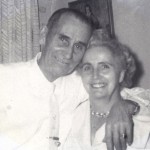 My grandfather, George Byer was a man of gentle strength. Many people may not think those to traits go together, but in him they did. He was always a hard-working man, who gave his all to support his family, but maybe the gentleness came partly from the fact that he had 9 children, 7 of whom were girls. That can make a man understand that girls are often the fairer gender, at least in those days. Grandpa Byer lived in a time when the women stayed home and raised the family and the men went out and made the living…even if that meant working long hours or multiple jobs. Grandpa also lived during the great depression, when jobs were scarce, so the women need not have bothered to go look for one very often.
My grandfather, George Byer was a man of gentle strength. Many people may not think those to traits go together, but in him they did. He was always a hard-working man, who gave his all to support his family, but maybe the gentleness came partly from the fact that he had 9 children, 7 of whom were girls. That can make a man understand that girls are often the fairer gender, at least in those days. Grandpa Byer lived in a time when the women stayed home and raised the family and the men went out and made the living…even if that meant working long hours or multiple jobs. Grandpa also lived during the great depression, when jobs were scarce, so the women need not have bothered to go look for one very often.
While times were tough sometimes, the family really never wanted for much, and grandma, Hattie Byer could somehow make the meager portions of food go a long way, and still never turn 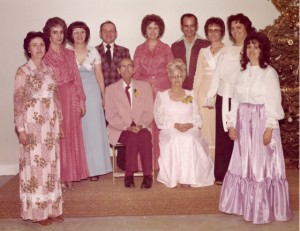 away a stranger in need of a meal, and it seemed there was always a plentiful supply of those strangers and friends who would come for dinner at the Byer house. They were a good team, and truth be told, Grandma Byer was probably just as tough, if not more so than Grandpa Byer, who did have a definite soft spot in his heart for people. Grandpa worked at a number of jobs, but the one I probably heard the most about was the building of Alcova Dam Grandpa had also worked on Kortez Dam and Pathfinder Dam, but my mom, Collene Spencer, who was Grandpa’s middle child, always mentioned to us that her dad had helped build Alcova Dam, every time we drove past it. She was very proud of her dad, and with good reason, because he was very special.
away a stranger in need of a meal, and it seemed there was always a plentiful supply of those strangers and friends who would come for dinner at the Byer house. They were a good team, and truth be told, Grandma Byer was probably just as tough, if not more so than Grandpa Byer, who did have a definite soft spot in his heart for people. Grandpa worked at a number of jobs, but the one I probably heard the most about was the building of Alcova Dam Grandpa had also worked on Kortez Dam and Pathfinder Dam, but my mom, Collene Spencer, who was Grandpa’s middle child, always mentioned to us that her dad had helped build Alcova Dam, every time we drove past it. She was very proud of her dad, and with good reason, because he was very special.
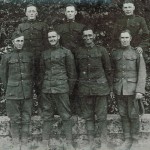 Grandpa served in the Army during World War I as a cook. While he was very brave, and never a man to shirk his duties, I think it would have been hard for this gentle soul to have a military career of killing people. Nevertheless, had the need arisen, he would have done it, because he always knew that he would protect those in his charge. He was a very loyal soldier, and he would never have allowed those he cared about to be killed, if he could stop it. His gentle strength was, for me, his trademark trait. I remember it from my childhood as clearly as if Grandpa Byer were standing right next to me as I write this story. he was the sweetest, kindest, most gentle man anyone could have known. Today would have been my Grandpa Byer’s 126th birthday. Happy birthday in Heaven, Grandpa. We love and miss you very much!!
Grandpa served in the Army during World War I as a cook. While he was very brave, and never a man to shirk his duties, I think it would have been hard for this gentle soul to have a military career of killing people. Nevertheless, had the need arisen, he would have done it, because he always knew that he would protect those in his charge. He was a very loyal soldier, and he would never have allowed those he cared about to be killed, if he could stop it. His gentle strength was, for me, his trademark trait. I remember it from my childhood as clearly as if Grandpa Byer were standing right next to me as I write this story. he was the sweetest, kindest, most gentle man anyone could have known. Today would have been my Grandpa Byer’s 126th birthday. Happy birthday in Heaven, Grandpa. We love and miss you very much!!
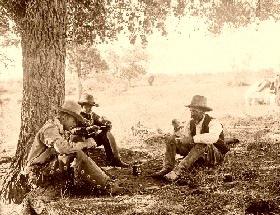 First chronicled by the famous western writer, Zane Grey, in his 1934 novel The Code of the West, no “written” code ever actually existed. However, the hardy pioneers who lived in the west were bound by these unwritten rules that centered on hospitality, fair play, loyalty, and respect for the land. These days, little of that code remains, or so it seems. These days, the more someone can get away with, he better they seem to like it. That just wasn’t the case for the people of thee old West. They needed to know that they could count on their neighbors, friends, and yes, even strangers
First chronicled by the famous western writer, Zane Grey, in his 1934 novel The Code of the West, no “written” code ever actually existed. However, the hardy pioneers who lived in the west were bound by these unwritten rules that centered on hospitality, fair play, loyalty, and respect for the land. These days, little of that code remains, or so it seems. These days, the more someone can get away with, he better they seem to like it. That just wasn’t the case for the people of thee old West. They needed to know that they could count on their neighbors, friends, and yes, even strangers
Ramon Adams, a Western historian, explained it best in his 1969 book, The Cowman and His Code of Ethics, saying, in part: “Back in the days when the cowman with his herds made a new frontier, there was no law on the range. Lack of written law made it necessary for him to frame some of his own, thus developing a rule of behavior which became known as the “Code of the West.” These homespun laws, being merely a gentleman’s agreement to certain rules of conduct for survival, were never written into statutes, but were respected everywhere on the range.”
Though the cowman might break every law of the territory, state and federal government, he took pride in upholding his own unwritten code. His failure to abide by it did not bring formal punishment, but the man who broke it became, more or less, a social outcast. His friends “hazed him into the cutbacks” and he was subject to the punishment of the very code he had broken. Though the Code of the West was always unwritten, here is a “loose” list of some of the guidelines: Don’t inquire into a person’s past. Take the measure of a man for what he is today. Never steal another man’s horse. A horse thief pays with his life. Defend yourself whenever 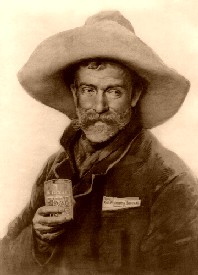 necessary. Look out for your own. Remove your guns before sitting at the dining table. Never order anything weaker than whiskey. Don’t make a threat without expecting dire consequences. Never pass anyone on the trail without saying “Howdy”. When approaching someone from behind, give a loud greeting before you get within shooting range. Don’t wave at a man on a horse, as it might spook the horse. A nod is the proper greeting. After you pass someone on the trail, don’t look back at him…it implies you don’t trust him. Riding another man’s horse without his permission is nearly as bad as making love to his wife. Never even bother another man’s horse. Always fill your whiskey glass to the brim. A cowboy doesn’t talk much; he saves his breath for breathing. No matter how weary and hungry you are after a long day in the saddle, always tend to your horse’s needs before your own, and get your horse some feed before you eat. Cuss all you want, but only around men, horses and cows. Complain about the cooking and you become the cook. Always drink your whiskey with your gun hand, to show your friendly intentions. Do not practice ingratitude. A cowboy is pleasant even when out of sorts. Complaining is what quitters do, and cowboys hate quitters. Always be courageous. Cowards aren’t tolerated in any outfit worth its salt. A cowboy always helps someone in need, even a stranger or an enemy. Never try on another man’s hat. Be hospitable to strangers. Anyone who wanders in, including an enemy, is welcome at the dinner table. The same was true for riders who joined cowboys on the range. Give your enemy a fighting chance. Never wake another man by shaking or touching him, as he might wake suddenly and shoot you. Real cowboys are modest. A braggart who is “all gurgle and no guts” is not tolerated. Be there for a friend when he needs you. Drinking on duty is grounds for instant dismissal and blacklisting. A cowboy is loyal to his “brand,” to his friends, and those he rides with. Never shoot an unarmed or unwarned enemy. This was also known as “the rattlesnake code”: always warn before you strike. However, if a man was being stalked, this could be ignored. Never shoot a woman no matter what.
necessary. Look out for your own. Remove your guns before sitting at the dining table. Never order anything weaker than whiskey. Don’t make a threat without expecting dire consequences. Never pass anyone on the trail without saying “Howdy”. When approaching someone from behind, give a loud greeting before you get within shooting range. Don’t wave at a man on a horse, as it might spook the horse. A nod is the proper greeting. After you pass someone on the trail, don’t look back at him…it implies you don’t trust him. Riding another man’s horse without his permission is nearly as bad as making love to his wife. Never even bother another man’s horse. Always fill your whiskey glass to the brim. A cowboy doesn’t talk much; he saves his breath for breathing. No matter how weary and hungry you are after a long day in the saddle, always tend to your horse’s needs before your own, and get your horse some feed before you eat. Cuss all you want, but only around men, horses and cows. Complain about the cooking and you become the cook. Always drink your whiskey with your gun hand, to show your friendly intentions. Do not practice ingratitude. A cowboy is pleasant even when out of sorts. Complaining is what quitters do, and cowboys hate quitters. Always be courageous. Cowards aren’t tolerated in any outfit worth its salt. A cowboy always helps someone in need, even a stranger or an enemy. Never try on another man’s hat. Be hospitable to strangers. Anyone who wanders in, including an enemy, is welcome at the dinner table. The same was true for riders who joined cowboys on the range. Give your enemy a fighting chance. Never wake another man by shaking or touching him, as he might wake suddenly and shoot you. Real cowboys are modest. A braggart who is “all gurgle and no guts” is not tolerated. Be there for a friend when he needs you. Drinking on duty is grounds for instant dismissal and blacklisting. A cowboy is loyal to his “brand,” to his friends, and those he rides with. Never shoot an unarmed or unwarned enemy. This was also known as “the rattlesnake code”: always warn before you strike. However, if a man was being stalked, this could be ignored. Never shoot a woman no matter what.
Consideration for others is central to the code, such as: Don’t stir up dust around the chuck wagon, don’t wake 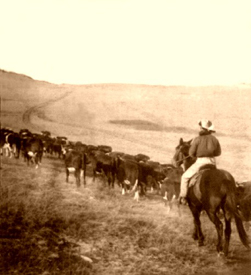 up the wrong man for herd duty, etc. Respect the land and the environment by not smoking in hazardous fire areas, disfiguring rocks, trees, or other natural areas. Honesty is absolute – your word is your bond, a handshake is more binding than a contract. Live by the Golden Rule. “The Code of the West was a gentleman’s agreement to certain rules of conduct. It was never written into the statutes, but it was respected everywhere on the range.“ Ramon F. Adams
up the wrong man for herd duty, etc. Respect the land and the environment by not smoking in hazardous fire areas, disfiguring rocks, trees, or other natural areas. Honesty is absolute – your word is your bond, a handshake is more binding than a contract. Live by the Golden Rule. “The Code of the West was a gentleman’s agreement to certain rules of conduct. It was never written into the statutes, but it was respected everywhere on the range.“ Ramon F. Adams
As I read through these “codes,” I have to think just how sad it is that so little of that beautiful code is practiced these days, and how very sad that is.
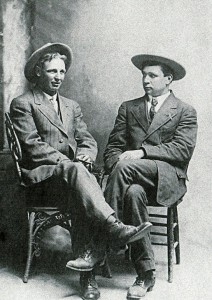 I have noticed in the family history books that my Uncle Bill Spencer put together over the years, that people in the family, or maybe that era, would sometimes just pick up and go visit a different branch of the family…often without much or any advance notice of their impending arrival. I suppose that sometimes they just got excited about finding out about a different branch of the family, and decided to go check it out for themselves. Being a bit shy around strangers, family or otherwise, I find this type of visit to be very strange indeed. What do you say to those people after the initial, “Hello, You don’t know me, but I am your relative from Wyoming.” I would simply have no idea. That is probably why most people who do go to visit relatives they don’t know or don’t know well, take someone else with them…to help carry the conversation. I can’t imagine going alone, and yet that seems to be the norm for some people.
I have noticed in the family history books that my Uncle Bill Spencer put together over the years, that people in the family, or maybe that era, would sometimes just pick up and go visit a different branch of the family…often without much or any advance notice of their impending arrival. I suppose that sometimes they just got excited about finding out about a different branch of the family, and decided to go check it out for themselves. Being a bit shy around strangers, family or otherwise, I find this type of visit to be very strange indeed. What do you say to those people after the initial, “Hello, You don’t know me, but I am your relative from Wyoming.” I would simply have no idea. That is probably why most people who do go to visit relatives they don’t know or don’t know well, take someone else with them…to help carry the conversation. I can’t imagine going alone, and yet that seems to be the norm for some people.
My grandfather did just that when he went out to visit his Aunt Tessie, as did his brother, my Great Uncle Clifford. Oddly, both of them just dropped in on Aunt Tessie!! I don’t know if Uncle Clifford just liked what he heard about Aunt Tessie from his brother, my Grandpa Allen Luther Spencer, or if he was curious about her and her family too, or if he even knew of the prior visit by a member of his family, but he went, and he went alone. I also have to wonder what Aunt Tessie thought of the whole thing…like, “What is it about me that makes these people keep just showing up here?” It appears to me, as it did to my Uncle Bill, that my cousin Cornelius Davis, who was Aunt Tessie’s son, found his cousin a little strange, or maybe the entire visit was just strange to him. It’s possible that he was wondering why these relatives just popped in like they did too, without any advance notice…or maybe he was wondering just how long this guy planned to stay.
Bob and I have gone many times to visit his family in Forsyth, Montana, but we always told them that we were coming, and our stay was just a week. I guess, in days gone by, when it takes a long time to get somewhere, it didn’t make sense just to stay a week, because it probably took several days driving out, so if all you had was a week, you would have to turn around and leave again. Still, I can’t imagine going for a visit without letting anyone know. Of course, the phone was not widely used in those days, so it would mean a telegraph, but it seems that many people just went and didn’t worry about it. Whatever the case may be, my cousin Cornealius seemed to think it was rather a strange visit indeed.

